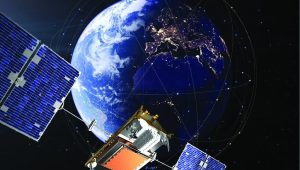Iridium Communications, a major player in satellite-based connectivity services, has announced an extension of the operational lifespan for its second-generation Iridium Next low Earth orbit (LEO) constellation. The decision comes following a recent engineering assessment, indicating that the current satellites are expected to perform reliably until at least 2035, providing the company with additional flexibility in its strategic planning.
CEO Matt Desch stated during Iridium's quarterly earnings call that the extended lifespan of the satellites offers opportunities for maximizing returns on investments and exploring potential upgrades in hardware at opportune moments. The decision also postpones the necessity for launching a potential third-generation constellation, allowing the company to assess market conditions more thoroughly.
Despite this optimistic outlook, Iridium acknowledges the evolving competitive landscape, particularly with the emergence of SpaceX's Starlink LEO constellation. The company anticipates a potential impact on its broadband business, especially in the maritime sector, as customers increasingly adopt alternative providers for primary broadband services.
However, Iridium aims to differentiate itself by focusing on providing backup connectivity with L-band spectrum, renowned for its resilience against adverse weather conditions, thus targeting a niche market segment. Additionally, the company is exploring opportunities in the direct-to-smartphone market, albeit facing regulatory challenges.
While competitors like SpaceX pursue regulatory approvals for utilizing terrestrial cellular partners, Iridium seeks to leverage its existing satellite infrastructure and approved L-band spectrum to provide messaging and SOS services directly to mass-market smartphones. Nevertheless, Desch acknowledges the complexities and regional variations in regulatory frameworks, indicating potential hurdles in the implementation of such initiatives.
In response to the evolving landscape, Iridium is evaluating strategic partnerships and initiatives, including potential collaboration with the newly formed Mobile Satellite Services Association (MSSA), aimed at promoting direct-to-smartphone services utilizing radio waves. Despite maintaining a self-contained strategy, Iridium remains open to exploring synergies with industry peers.
Termed “Project Stardust,” Iridium's direct-to-smartphone strategy entails significant investments over the coming years, emphasizing updates to hardware infrastructure and gateways. The company remains cautiously optimistic about its growth prospects, forecasting service revenue growth of 4-6% for the year 2024.
Photo: Thales Alenia Space
